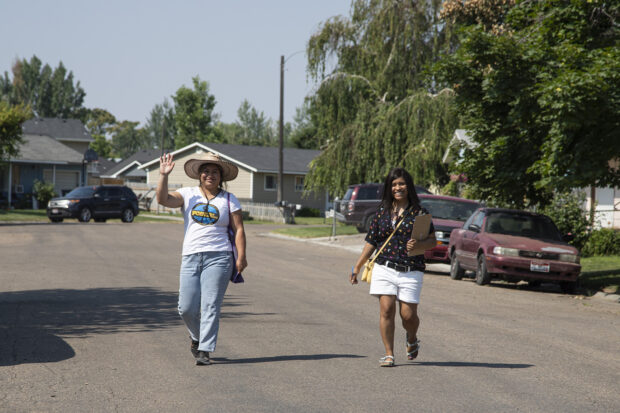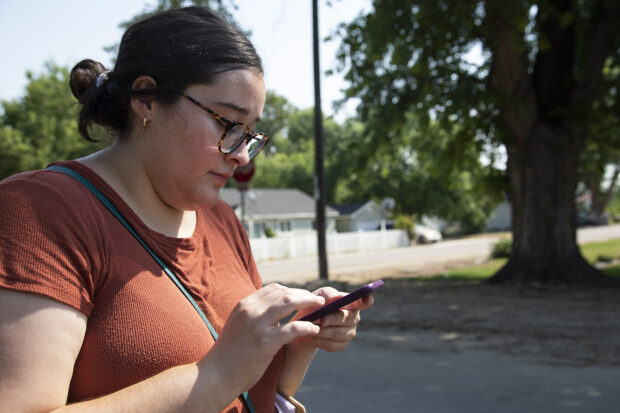
WILDER — The three community organizers met at a quiet park in Wilder on a Saturday morning, under a hazy wildfire sky. The weather was fast-approaching 80 degrees in the middle of a heatwave as the women started their work, pounding the pavement of the small agricultural town where nearly 70% of all residents are Latino.
“We’re knocking on doors in the community, to talk about education,” canvasser Karina Guadarrama said to the folks who opened their doors to her. At Spanish-speaking homes, canvassers stepped easily into that language instead.
PODER of Idaho, an organization that focuses on mobilizing Idaho’s Latino community, is working with the Idaho Education Association to engage Latino communities across the state in conversations about education. The new campaign, called PODER Colectivo para la Educación (Collective power for education), aims to help and encourage Latinos to get involved with their schools, school boards and at the ballot box to advocate for the education issues that matter to them. The goals are many: To help ensure Latinos voices are included in education decisions, to hopefully spur more Latino representation on school boards and to encourage students to take the lead in improving the education system.

“We’re really focused on how can we help our community advocate for the things that they need, especially when many of our folks are undocumented or feel like they don’t have power. Together we do,” said Estefanía Mondragon, PODER’s Executive Director.
Latinos make up 13% of Idaho’s population, but nearly 20% of all public school students. The Census Bureau estimates that about 80% of Idaho’s Latinos are U.S. citizens, and that number jumps among children: 98% of Latino youth are U.S. Citizens, almost all of them born in the U.S.
Last Saturday’s canvass in Wilder was the first assignment where hired canvassers and PODER staff asked folks about education, helped them register to vote, and asked if they’d be interested in learning more about PODER’s efforts to amplify the voices of Idaho’s Latinos.
The campaign is a homecoming of sorts for Guadarrama, who grew up in Mountain Home. After graduating from Boise State University with degrees in communication and ethnic studies, she moved to Las Vegas to work on a Democratic campaign during the presidential election.
“I always thought you had to leave Idaho to make a difference,” she said.
After Biden won the election, Guadarrama moved back to Mountain Home and got a job with PODER. Guadarrama was part of the English language learner program in elementary school, and remembers her mother feeling like the only parent among her Spanish-dominant friend group who would attend school gatherings.
“I want to see more of the Hispanic population engaged in education, whether it’s like advocating for better education, language access, cultural curriculum or mental health stuff,” she said. “I want to see them advocate for that, or run for school board even. I want to see more leadership that represents them.”
Guadarrama walked through neighborhoods strewn with evidence of children: Barbie playhouses and tricycles in front lawns, unicorn curtains over windows and basketball hoops erected in cul-de-sacs. She knocked at a two-story house near the fire department, with two small scooters abandoned on the front lawn. It was an older student who answered the door.
Jose Mendoza, who is studying in the electrician program at the College of Western Idaho, didn’t attend Wilder’s public schools. He graduated from Homedale, one district over. If he could change one thing about schools, Mendoza said he’d want students to feel that they had someone to relate to.
Mendoza didn’t put much effort into education until his last two years of high school, when two teachers inspired him to double-down. He remembers them still: two white women, one with blue eyes and one with brown hair. They spoke Spanish, he said, so students couldn’t get away with hiding anything from them. One teacher worked hard to find common ground with Mendoza, asking him what he wanted to do with his future and offering suggestions for things he might be interested in. At first, Mendoza tried to dodge the teachers, he said, but eventually they broke through.
“They’d really try hard to push you. Sometimes I’d find it annoying, other times it was like, ‘I know I can do this, why am I struggling?” he said. When he did struggle, the teachers were there to help him, spending extra time with him after school, investing in his success.
One in five Idaho students is Latino, but there is scant representation of the Latino community among school staff, or state and local education leadership. Less than 3 percent of Idaho’s teachers and administrators are Latino.
Mondragon said she’s been hard pressed to find Latino school board members even in majority-Latino districts, with the exception of Caldwell. There is no official count of Latino school board members statewide. Idaho School Boards Association representative Quinn Perry said she’s not sure the organization has ever surveyed its members to compile diversity statistics.
Mondragon said she’s hopeful the campaign will encourage more Latinos to get involved in school board races, but that’s not the sole focus.
“For us, it’s about how do we build leadership across the community, not just in the political sphere,” she said.

Mondragon also hopes the campaign will dispel misperceptions that Latino parents are not involved in their children’s education. In a series of community roundtables about education, she said the number one issue PODER has identified is a lack of language access for Spanish speakers. Parents often struggle to find someone at their children’s school who can help answer their questions, she said, and school-board meetings are rarely translated.
“Folks can’t get involved with their children’s education if they don’t know what’s going on,” she said. “When a school district says we want Latinx parents to get involved, how much do you want them to get involved? If you’re not actively working for language access… you’re pushing parents out.”
Communication is also a top priority for Adriana Lopez, a Wilder parent with three kids in the public school system. Her students attended school online last year, she said, and despite working with her children daily she often felt left out-of-the-loop, to the point where her kindergartener almost missed his graduation.
Lopez was able to go to the district to advocate for her children. But she says that many in Wilder’s Latino community don’t speak fluent English or are busy working in the hops, corn, and other fields that surround the rural town. She thinks the district could do more to make sure it is communicating with, and including, all parents.
“They really don’t push like ‘hey this is what’s going on with the school,’ or ‘hey, let’s get you involved with the school,’ beyond community events,” she said.” I think every parent is worth giving a shot… to be invited to be involved.”
